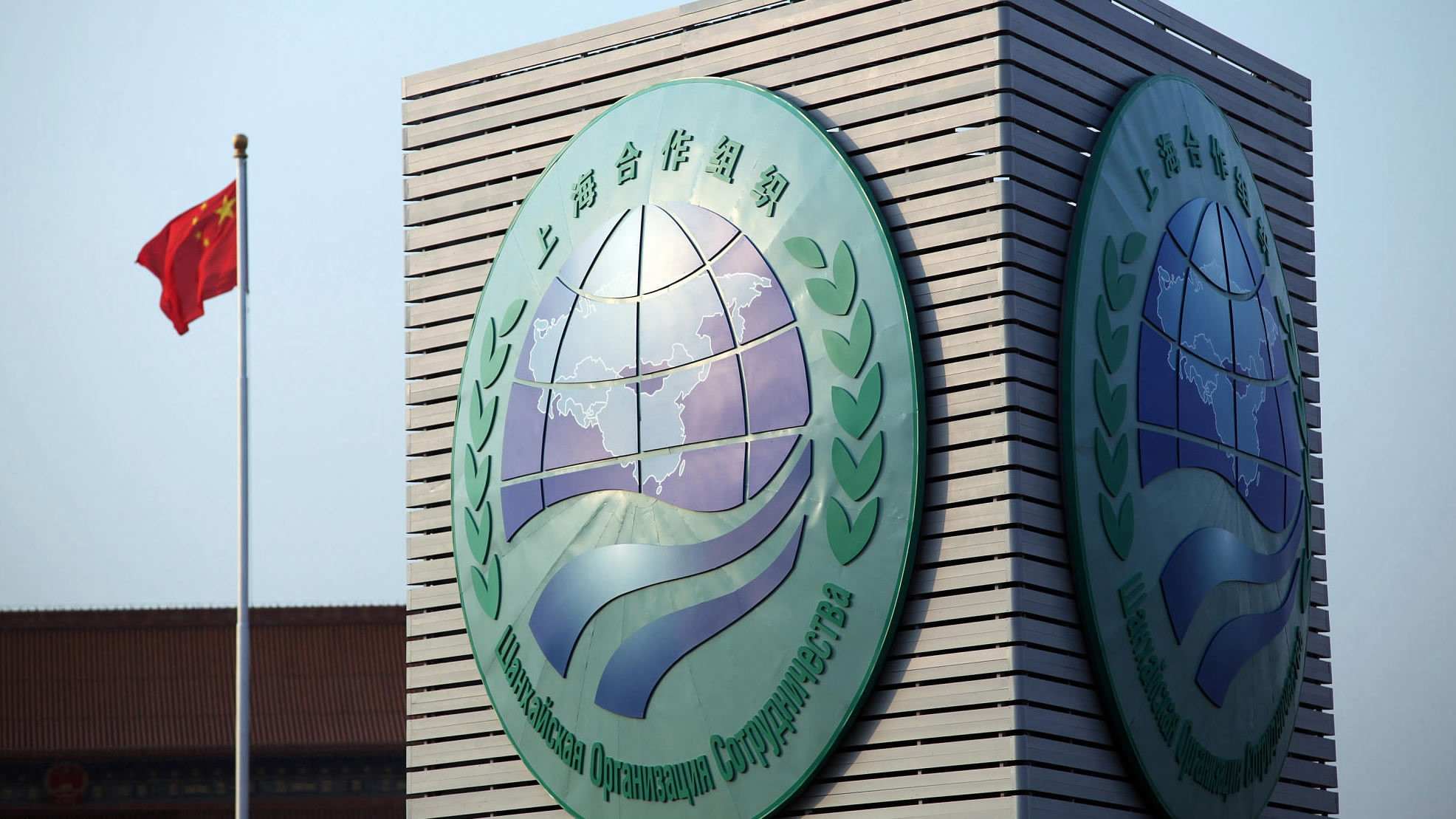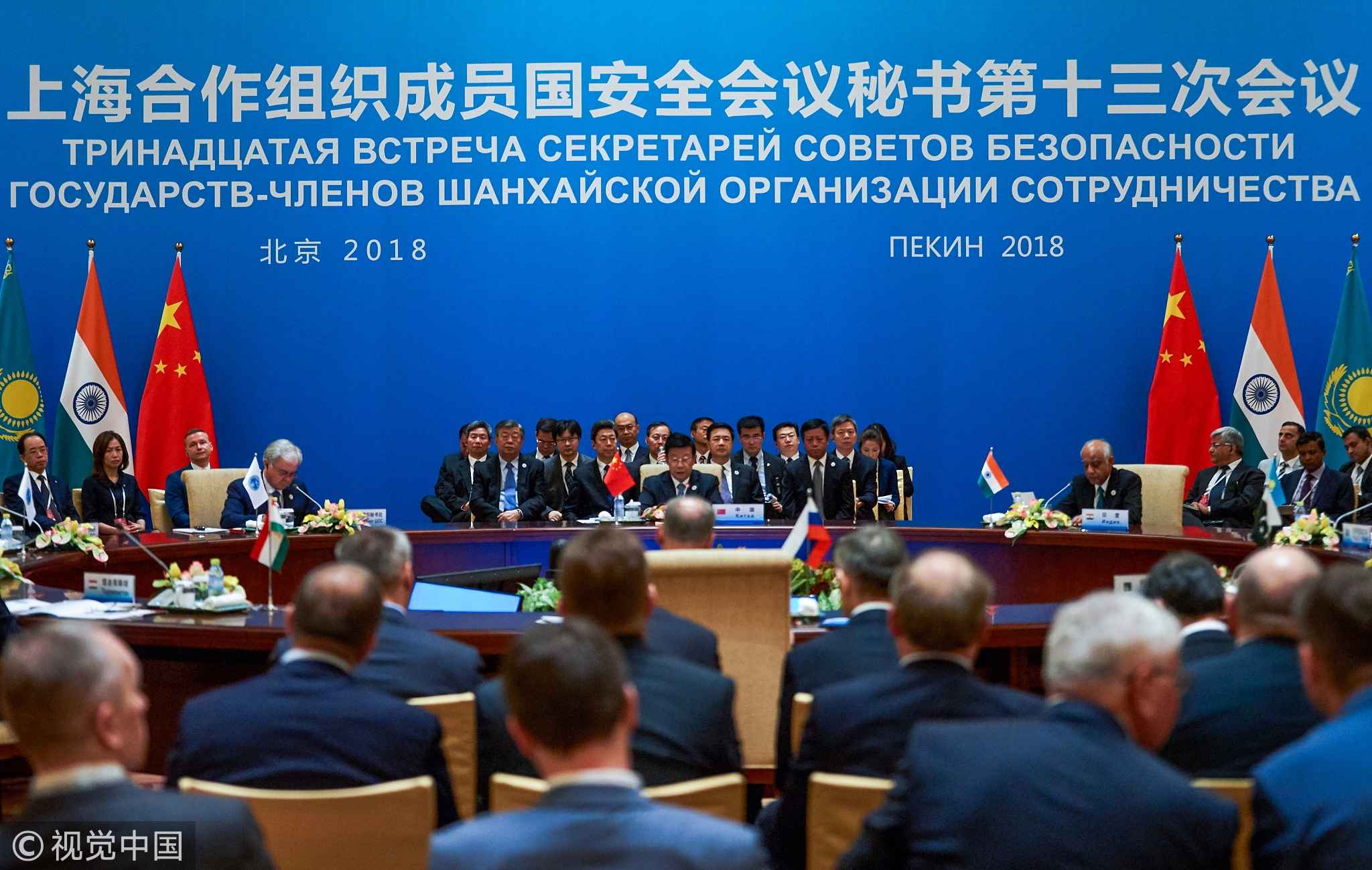
Opinions
21:51, 03-Jun-2018
Opinion: The undying importance of the 'Shanghai Spirit'
By Zhang Xin

Editor’s Note: Zhang Xin is a Research Fellow at School of Advanced International and Area Studies, East China Normal University. The article reflects the author's opinion, and not necessarily the views of CGTN.
The Qingdao Summit of the Shanghai Cooperation Organisation (SCO) is the first summit after the enlargement of this organization to include India and Pakistan as new full members.
It is also set in an unprecedented geopolitical and geo-economic context, where the current hegemonic power, the US, is further retreating from an open, multilateral international order and the broadly defined Europe-Asia region is witnessing new signs of chaos and disorder, including the uncertain situation on the Korean Peninsula, the Iran nuclear deal and the on-going conflicts in Syria, among others.

A Syrian man cycles past the Grand Mosque in Douma on the outskirts of Damascus on April 16, 2018 after the Syrian army declared that all anti-regime forces have left Eastern Ghouta. /VCG Photo
A Syrian man cycles past the Grand Mosque in Douma on the outskirts of Damascus on April 16, 2018 after the Syrian army declared that all anti-regime forces have left Eastern Ghouta. /VCG Photo
The “Shanghai Spirit”, as the undergirding values and guidelines for the SCO, features mutual trust, mutual benefit, equality, consultation, respect for cultural diversity, and pursuit of common development.
Its essence is very much consistent and compatible with the famous Five Principles of the Peaceful Co-existence set in the 1950s, and takes on new connotations of mutual benefit and common development. It serves not only as a precious cultural and institutional resource for SCO as an international organization, but also as a potential model for new types of inter-state relations on a global scale.
Relative to 2001, when the Shanghai Spirit became the guideline for the SCO cooperation, SCO in 2018 is obviously situated in a different context.
On the one hand, over the course of 17 years, the organization itself has accumulated precious organizational practices, experiences, and memories, in implementing the Shanghai Spirit. Its operations in the field of security cooperation, one of the three major fields set in SCO’s original organization mandate, have been overall very successful, despite some earlier suspicion both within and outside the region of the feasibility of such cooperation.

The 13th meeting of secretaries of the SCO (Shanghai Cooperation Organisation) member states takes place in Beijing, May 22, 2018: /VCG Photo
The 13th meeting of secretaries of the SCO (Shanghai Cooperation Organisation) member states takes place in Beijing, May 22, 2018: /VCG Photo
On the other hand, the recent changes in the global context bring to the fore the value of the Shanghai Spirit. Due to the challenges from post-Cold War globalization, the US and most Western liberal countries have been quickly retreating from the practice of “multiculturalism” in domestic sphere, which used to emphasize mutual respect and peaceful co-existence of different cultures.
In contrast, the Shanghai Spirit, in its own manner, outlines an essential cosmopolitan world view, built on horizontal, cooperative relations among member states, despite differences between most SCO members’ domestic political systems and Western societies. Thus, the Shanghai Spirit is worthy of more appreciation in and outside of SCO.
As the Chinese idiom goes, “never forget why you started, in this way can your mission be accomplished,” the Qingdao Summit is the right time for all participants to dwell on how to further implement and promote the Shanghai Spirit.
The abstract Shanghai Spirit always needs to find its expression in concrete institutional development and policy settings. With the enlargement of SCO and the quickly shifting geopolitical context, a few key questions should be on the agenda of SCO for this Qingdao summit.

Night view of Qing Dao, China, where the 18th SCO Summit will take place on June 9th. /VCG Photo
Night view of Qing Dao, China, where the 18th SCO Summit will take place on June 9th. /VCG Photo
For example, how to ensure the expanded membership of the organization does not translate into political stalemate in internal decision making? How to make use of the existing formal rules, decision-making procedure, and informal organizational resources and legacies of SCO to accommodate or even “reframe” the interests and potentially different political cultures and working styles of the new members?
In terms of membership and mandate of SCO, should SCO keep its core geographic focus on Central Asia or take a broader Eurasian view to consider possible new full membership of Iran, or even other countries in the Middle East, North Africa and Southeast Asia?
Among the three major fields of cooperation, development in the economic and cultural spheres between SCO members obviously leaves a lot to be desired. What can be further promoted to enrich the functions and relevance of SCO in these fields, so as to avoid the possibility of SCO gliding down to a “talking shop”?
How to improve the efficiency and quality of internal governance for an enlarged SCO while combating against increasing internal bureaucratization? What can and shall be included in the SCO agenda, rather than on a bi-lateral level? All in all, one should pay particular attention to how to implement such abstract principles as the Shanghai Spirit in all these concrete settings.
In past experiences, when China served as the host country for SCO summit, the summit usually helped to make new, crucial progress for SCO. We will see how the Qingdao Summit would keep this tradition to make concrete achievements in the Shanghai Spirit.

SITEMAP
Copyright © 2018 CGTN. Beijing ICP prepared NO.16065310-3
Copyright © 2018 CGTN. Beijing ICP prepared NO.16065310-3